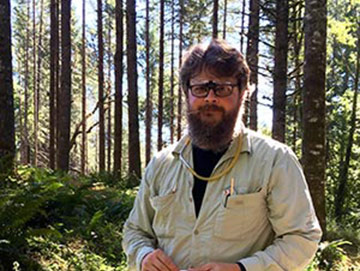
Chadwick V. Tillberg
Chadwick V. Tillberg Professor

Keck Science Center 252
My research focuses on terrestrial invertebrate community ecology. Specifically, I am interested in how ants affect food web interactions. Recent work has investigated invasive ant species in Oregon, how ants affect the population of an endangered species and how ants affect plant/herbivore/predator interactions. Linfield students have always played an important role in my research, participating in field and lab studies and presenting our findings at regional and national meetings.
Teaching Principles of Ecology, Animal Behavior, Insect Biology, and Principles of Biology provide me the opportunity to read, think, discuss and share concepts around these topics with students. Students also have the opportunity to conduct collaborative research with classmates in these areas.
Education
- B.A., biology, University of Kansas, Lawrence, KS
- Ph.D., environmental, population and organismic biology, University of Colorado, Boulder, CO
- Postdoctoral research, department of animal biology, University of Illinois, Urbana-Champaign, IL
Research interests
- Terrestrial invertebrate community ecology
- Behavioral ecology
- Food web interactions
Academic interests
My research examines the behavior and ecology of terrestrial invertebrates. I am particularly interested in the role of omnivory in food web interactions and the effect of non-native species in the communities they invade.
Check out the podcast that I co-host, Crisscrossing Science! Do you have a science question that could make for a good episode? Email it to crisscrossingsci@gmail.com.
Publications
Baratelli, E., Tillberg, C., Suarez, A. Menke, S. Naughton, I. Holway, D. Variation in Argentine ant (Linepithema humile) trophic position as a function of time. Biol Invasions 25, 133–140 (2023).
Thomas CC, Tillberg CV, Schultz C (2020) Ant attendance increases survival of an endangered facultative myrmecophilous Lycaenid. Journal of Insect Conservation 24:385–395.
Mooney E, Phillips J, Tillberg CV, Sandrow C, Nelson A, Mooney KA (2016) Abiotic mediation of a mutualism drives herbivore abundance. Ecology Letters 19:37-44.
Tillberg CV, Edmonds B, Freauff A, Hanisch PE, Paris C, Smith CR, Tsutsui ND, Wills BD, Wittman SE, Suarez AV (2014) Foraging Ecology of the Tropical Giant Hunting Ant Dinoponera australis (Hymenoptera: Formicidae)—Evaluating Mechanisms for High Abundance Biotropica 46:229-237.
Smith CR, Suarez AV, Tsutsui ND, Wittman SE, Edmonds B, Freauff A, Tillberg CV (2011) Nutritional asymmetries are related to division of labor in a queen-less ant. Public Library of Science ONE 6:e24011
Menke SB, Suarez AV, Tillberg CV, Chou CT, Holway DA (2010) Trophic ecology of the invasive Argentine ant: spatio-temporal variation in resource assimilation and isotopic enrichment. Oecologia 164:763-771.
Lach L, Tillberg CV, Suarez AV (2010) Contrasting effects of an invasive ant on a native and an invasive plant. Biological Invasions 12:3123-3133.
Smith CR, Tillberg CV (2009) Protocol: Stable isotope and elemental analysis. In Emerging Model Systems. Cold Springs Harbor.
Smith CR, Anderson KE, Tillberg CV, Gadau J, Suarez AV (2008) Caste determination in a polymorphic social insect: nutritional, social and genetic factors. American Naturalist 172: 497–507.
Tillberg CV, Holway DA, LeBrun EG, Suarez AV (2007) Trophic ecology of invasive Argentine ants in their native and introduced ranges. Proceedings of the National Academy of Sciences 104: 20856–20861.
Grants
Bureau of Land Management, US Department of Interior – RENEWAL: Potential non-target effects of herbicides on the terrestrial invertebrate community: Addendum to: Long term effects of new treatments across multiple Fender’s blue butterfly sites within the West Eugene Wetlands $4340, 2018
Bureau of Land Management, US Department of Interior – RENEWAL: Potential non-target effects of herbicides on the terrestrial invertebrate community: Addendum to: Long term effects of new treatments across multiple Fender’s blue butterfly sites within the West Eugene Wetlands $4340, 2017
Bureau of Land Management, US Department of Interior - Potential non-target effects of herbicides on the terrestrial invertebrate community: Addendum to: Long term effects of new treatments across multiple Fender’s blue butterfly sites within the West Eugene Wetlands $4340, 2016
